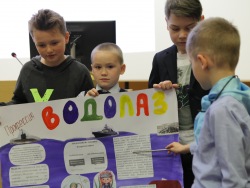The first year of the Aquarium’s large-scale educational project is over.

The first year of the Growing up at the Aquarium project ended with a graduation ceremony. The event was attended by participants in all four project stages and their parents, as well as by participants in the Crystal Bridge project designed for children with special needs. More than 50 children aged between 5 and 17 took part in the Growing up at the Aquarium project in 2018-2019 school year.
The project has grown out of “Belyok”, an environmental biology studio for children aged 5 to 7 years. At this, very first, stage children get acquainted with a range of professions related to providing the Aquarium inhabitants with proper living conditions. Last year two professions concerned with the environment exploration (geologist and botanist) were added to the program. The stage participants accompanied by their teacher visited the Far East Geological Institute, FEB RAS, and the Botanical Garden-Institute, FEB RAS.
The second stage of the Growing up at the Aquarium project is called “Young ichthyologist”. During the classes children “dived” into the world of aquarium fishes to become familiar with their behaviours and learnt how to create conditions favorable to certain fish species.
The third stage is a “Man and Sea” art studio. There pupils tried to depict the harmony of the world around us and the beauty of marine inhabitants in their paintings and handicrafts. Young participants were taught to draw people’s attention to the problems of the World Ocean through art.
“Aqua Laboratory”, the fourth stage of the project, is developed for middle and senior school children.
“I consider the first year of “Aqua Laboratory” to be a success. Though the group was of mixed age - from 12 to 17 years - all the children helped each other, and younger pupils tried to keep up with the older ones,” said Liubov Gliznutsa, Lead Specialist at the Environmental Education Department. “This stage has attracted pupils planning to engage themselves in biology, medicine and even paleontology. Children were involved in diverse activities: they attended laboratory practicals and lectures, watched science education films, explored microscopes and did not have time to be bored. Not long ago we went on a paleopicnic on Russky Island where the stage participants and their parents found Triassic shark teeth and ammonoids.”
According to Olga Shevchenko, Head of the Environmental Education Service, this autumn the Growing up at the Aquarium project will expand to include one more stage offering some new interesting topics to marine researchers aged between 11 and 14 years.